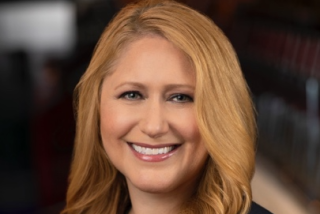Spanish-language broadcaster Univision to name Vincent Sadusky as CEO

Univision Communications is poised to name industry veteran Vincent Sadusky as its chief executive, in the latest sign of turmoil at the Spanish-language broadcasting company.
The changing of the guard was confirmed Tuesday by two people close to the company who were not authorized to comment. It comes less than three months after the TV company announced that its longtime chief, Randy Falco, would retire by year’s end — even though the company had just extended Falco’s employment contract to 2020.
Sadusky has spent much of his career at midsize TV firms. Until early last year, he was chief executive of the Virginia-based television station owner Media General Inc., until it was acquired by Nexstar Media Group. He also managed another TV station owner, LIN Media, until that company was absorbed by Media General amid the consolidation of local media.
Earlier in his career, Sadusky worked as chief financial officer of another major Spanish-language television company, Telemundo, which is owned by NBCUniversal and considers itself an archrival of Univision. Sadusky began his career at the accounting firm Ernst and Young. He is a board member of Hemisphere Media Group, which provides programming targeting Latin American audiences, including the Spanish-language movie channel Cinelatino.
Univision has been reeling in recent months. In April it eliminated more than 150 positions that cut deep within its troubled digital arm, Fusion Media Group.
Once the dominant Spanish-language media giant, Univision has struggled to remain relevant among Spanish-speaking audiences and it has faced growing competition from Telemundo.
Univision has long counted on new immigrants from Mexico to replenish its audience, but immigration has slowed considerably during the last six years. Now, a majority of Latinos are born in the U.S. and are fluent in English, making them less reliant on Spanish-language TV and radio stations for their news and entertainment.
New York-based Univision and its equity partner, Grupo Televisa of Mexico, also have seen their once-popular Mexican-produced telenovelas lose steam in the ratings. The two companies have been scrambling to better adjust to a more competitive environment and create content that is more relevant to the lives of U.S.-born Latinos.
At the same time, Telemundo has made a splash with edgy prime-time dramas with high production values. This summer, Telemundo will broadcast the Latin world’s biggest event, the FIFA World Cup, after the network wrestled those rights away from Univision, which had long been home to the soccer event.
Bloomberg News first reported that Sadusky was in line to become the new chief executive. Univision representatives declined to comment late Tuesday.
Falco, a former high-ranking NBC and AOL executive, began his tenure at Univision in 2011 by focusing on strengthening the management and operations of Univision. For many years, he worked well with executives from Televisa, which has become more reliant on Univision for revenue now that the company is competing with Netflix on its home turf in Mexico.
But in recent months, Univision’s board has become more fractured due to the competing interests of various shareholders.
Univision is owned by a consortium of private equity owners and Los Angeles billionaire Haim Saban who bought the Spanish-language media company in 2007 for more than $13 billion — a leveraged buyout at the top of the market that left the company drowning in debt. In 2015, the company unveiled plans for a public offering that would have allowed Saban Capital and the other private equity firms to finally begin an exit. But then, the challenges of the larger media sector began to worry investors.
Late last year, the company brought in a consulting firm to identify $200 million in cuts. The company’s digital strategy has foundered in less than two years.
In January, 2016, Univision acquired the Onion satirical site, an unusual fit for a company that prides itself as a news authority. About six months later it spent $135 million to buy Gawker Media brands, and promptly shut down the flagship Gawker website because of legal liabilities. It operated Gawker’s other sites, including Deadspin, Gizmodo and Jezebel — but advertising did not materialize. Special events, such as a well-publicized concert at the U.S.-Mexico border, fizzled.
In the first quarter of this year, Univision’s revenue declined 1.2% to $684.2 million compared with the year-earlier period. And profit tumbled 18% to $47.4 million.
Univision first delayed its IPO plan but then, earlier this year, the company said it had abandoned the effort.
UPDATES:
7 p.m.: This article was updated wtih additional background on Univision.
This article was originally published at 5:50 p.m.
More to Read
Inside the business of entertainment
The Wide Shot brings you news, analysis and insights on everything from streaming wars to production — and what it all means for the future.
You may occasionally receive promotional content from the Los Angeles Times.







